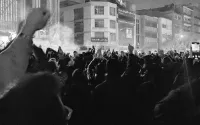24 May 2005Stephen R. Shalom
A little over two years ago, anti-war demonstrations of unprecedented magnitude rocked the globe and the New York Times termed the anti-war movement "the world's second superpower." Unfortunately, no one could mistake the anti-war demonstrations that took place this spring for the "world's second superpower."
On some level this fall-off from February 2003 was inevitable. Opposition to war then was a no-brainer, while the current occupation raises tough questions: now that the United States government has devastated Iraqi society, what should be done? Some of those who argue that the U.S. needs to stay in Iraq are unreconstructed imperialists, but some make this argument out of a genuine sense of concern for the Iraqi people.[1] But however sincere they may be, those who take this position are wrong in their belief that the occupation can help Iraqis, and the anti-war movement needs to explain to them why this is so.
Out Now!
Aren't U.S. troops protecting Iraqis from awful violence, many ask? There is indeed gruesome violence in Iraq today, but U.S. forces are not keeping this violence in check. On the contrary, the brutality of the U.S. occupation is a major incitement to the violence.
Can anyone doubt that the tortures at Abu Ghraib -- with their emphasis on humiliation -- have created thousands of hostile, even violently hostile, Iraqis?
Or consider Fallujah. In the first assault, in April 2004, U.S. troops slaughtered hundreds in the city, a majority of whom, according to hospital officials, were women and children, with U.S. forces firing at ambulances, and blocking access to hospitals.[2] Then in November 2004, the U.S. essentially leveled the city, with who knows how many casualties because the press was kept out.
Today in Fallujah we can get some real insight into how the U.S. provides security for the Iraqi people. U.S. officials claim that "Fallujah is now the safest city in Iraq," but, as one resident noted, it's the safest city "because it's a prison."[3] More than two-thirds of the city's inhabitants are still refugees, and "[t]here is a dawn-to-dusk curfew and a cordon around the city that only allows Fallujans who have registered with the U.S. military and received ID cards to enter and leave it."[4]
Consider another example of U.S. conduct and imagine the contribution it is likely to have made to fueling the insurgency. Rory McCarthy from the Guardian writes:
"Last May [2004] I attended a vast family funeral in Ramadi where witness after witness described in detail how U.S. jet fighters attacked a village near the Syrian border after a wedding party and killed 42 people, among them women, children and even the musicians who had played for the bride and groom.
"Many of the dead were buried in a graveyard on the outskirts of Ramadi. One of the graves was marked with a square of roughly cut stone inscribed simply: 'The American bombing.'
"But a U.S. general in Baghdad insisted that the attack had been aimed at a gathering of 'foreign fighters' in a 'safe house' and, despite video footage of the party, said there had been no evidence of a wedding. Then, after a pause, he added with a smile: 'Bad people have celebrations too.' An inquiry was announced, but the military has yet to acknowledge that it made a mistake."[5]
What sort of reaction do U.S. airstrikes elicit from Iraqis? Consider the reaction last October of interim President Ghazi Yawar -- a U.S. appointee: "'Air strikes on cities are ... not acceptable in any way.'... 'I consider it collective punishment.'"[6] If this is the attitude of U.S.-appointed elites, one can imagine the reaction of those in the targeted neighborhoods.
Nor has the military changed its approach. In May 2005 it launched Operation Matador in western Iraq. As Knight Ridder reported,
"In interviews, influential tribal leaders and many residents of the
remote border towns said the 1,000 U.S. troops who swept into their
territories in the weeklong campaign that ended over the weekend didn't distinguish between the Iraqis who supported the United States and the fighters battling it.
"'The Americans were bombing whole villages and saying they were only after the foreigners,' said Fasal al Goud, a former governor of Anbar province who said he asked U.S. forces for help on behalf of the tribes. 'An AK-47 can't distinguish between a terrorist and a tribesman, so how could a missile or tank?'"[7]
U.S. rhetoric matches its behavior. Consider the likely reaction from Iraqis on learning that when U.S. undersecretary of defense William Boykin was asked whether the government should re-establish a program of identifying and assassinating specific adversaries in Iraq, like Operation Phoenix conducted in Vietnam by the C.I.A., he replied that U.S. forces were "doing a pretty good job of that right now."[8]
Or consider the likely Iraqi reaction to Lt. Gen. James Mattis, a U.S. Marine commander in Iraq, who publicly stated on February 1, "It's fun to shoot some people."[9] Now of course, the U.S. troops are not the only foreign forces in Iraq; the largest contingent after the U.S. is private mercenaries. And one of the biggest of the private security firms is Blackwater. On March 7, after the furor over Mattis' comments, the president of Blackwater sent an email to his employees telling them that "actually it is 'fun' to shoot some people."[10]
Rather than protecting Iraqi civilians, U.S. armed forces have shown themselves to be the main danger to Iraqi civilians. According to the Iraqi Health Ministry in September, operations by U.S. and allied forces were killing twice as many Iraqis -- most of them civilians -- as attacks by insurgents.[11]
Now there's an explanation for this, say U.S. officials. An American military spokesperson pointed out that insurgents were living in residential areas, sometimes in homes filled with munitions. "As long as they continue to do that, they are putting the residents at risk.... We will go after them."[12] Compare this approach with how you would expect any civilized law enforcement officers to behave if they actually had any concern for the well-being of the population. If there were a bad guy holed up in a residential area with lots of munitions would we want the officers to bomb the apartment, setting off the munitions, and then say it was all the bad guy's fault?
But here's the thing. Even without this extreme brutality, the U.S. presence would provoke Iraqi hostility. Why? Because no people like foreign occupation. It is precisely the U.S. determination to control Iraq -- militarily, economically, and politically -- that incites many Iraqis to resort to an armed response. The U.S. has no legitimacy and it is the U.S. presence and U.S. policies that fuel the insurgency.
In the words of the extremely mainstream International Crisis Group,
"the insurgency is not confined to a finite number of fanatics isolated from the population and opposed to a democratic Iraq but is fed by nationalist feelings, widespread mistrust of U.S. intentions and resentment of its actions."[13]
Why would there be mistrust of U.S. intentions?
Consider. Despite intermittent optimistic reports, the Pentagon has indicated that U.S. force levels in Iraq will remain close to current levels for years to come.[14]
What sort of credibility can the United States have as a protector of the Iraqi people when, at the very same time that it proclaims its concern for Iraqis, it is presiding over the corporate looting of Iraq and trying (in the words of the Wall Street Journal) "to remake Iraq's economy in the U.S. image."[15]
How can the country that is building long-term military bases in Iraq for the indefinite future[16] be taken seriously as a disinterested defender of Iraqi interests?
Why would Iraqis trust a country determined to control the world's oil supply? A Gallup poll in Baghdad in August 2003 showed that 5% of Iraqis believed the U.S. invaded Iraq "to assist the Iraqi people," 4% believe it was to destroy WMDs, only 1% believe it was to establish democracy, while 43% said the U.S.-UK invasion was "to rob Iraq's oil."[17] Nothing that has transpired since then is likely to have changed this assessment.
And, of course, the Bush administration's continuing endorsement of Israeli oppression of Palestinians makes U.S. troops a provocation wherever they are in the Arab world.
Rather than the U.S. troop presence preventing insurgency, it is clear that the insurgency would be much reduced if U.S. troops were to withdraw. For example, we know that today many insurgents draw heavily on religious motivation. But consider that the Association of Muslim Scholars, the leading Sunni religious group, with ties to the resistance, has declared that if a date were set for withdrawal it would issue a fatwa against anyone continuing an insurgency.[18] Thus, if the occupation were ended, the insurgency would be significantly undercut.
Ending the occupation is consistent with the views of the Iraqi people. How do we know this? One indicator is a poll conducted by Zogby International in late January that showed that 82 percent of Sunni Arabs and 69 percent of Shiites favored U.S. withdrawal "either immediately or after an elected government is in place."[19]
What about the elections? Bush would have you believe that the 58% of registered Iraqi voters who went to the polls at the end of January were voting for him, for the United States. But in fact, the vote was a thorough-going repudiation of the U.S. occupation. First of all, Washington had previously opposed elections -- and only mass demonstrations called by Grand Ayatollah Ali al-Sistani forced U.S. officials to agree to hold elections. Many Iraqis didn't vote because they considered elections held under an occupation to be unfair, but those who did vote voted overwhelmingly for parties that called for an end to the occupation.[20] The U.S. favorite came in a distant third -- but even his supporters felt the need to campaign with banners that said in Arabic: "Vote for Allawi's slate if you want a strong Iraq free of foreign troops."[21]
Iraqis do not think things will be all peaches and cream after a U.S. withdrawal. For example, Hassan Jama'a Awad, head of the Southern Oil Company Union, has said that the members of his union want an immediate end to the occupation; while acknowledging there might be attacks on trade unionists, he says "we have to solve our problems ourselves" and that things wouldn't be worse than under the occupation.[22]
Ending the occupation not only will substantially reduce any insurgency, but it will also strengthen democratic, feminist, and tolerant forces. To see why this is so, consider the dilemma faced by any Iraqi endorsing these sorts of progressive values. As long as the occupation continues, these values will tend to be discredited. And reactionary forces fighting the occupation continually gain in credibility. As journalist Patrick Cockburn has noted, "Washington never appreciated the fact that the U.S. occupation was so unpopular that even the most unsavoury groups received popular support." Indeed, the U.S. forces "were the recruiting sergeants of the resistance."[23] In the election, the major Arab secular party was that of Allawi -- the U.S.-appointed ruler running essentially as the U.S. candidate; no doubt this led many progressive Iraqis, if they voted at all, to cast their ballots for Islamic parties committed to getting rid of U.S. troops.
Now what exactly is meant by immediate withdrawal? No one believes that a withdrawal could take place overnight. Most of those who call for immediate withdrawal mean in fact an orderly process, based on a clear and internationally sanctioned short timetable.[24] So why do I say we should support "immediate withdrawal" when I don't think this is literally accurate. First, because it is consistent with the language we have used in the cases of other illegitimate occupations. We said "Out Now" for Soviet troops in Afghanistan, and we say "Out Now" for Israeli troops in the occupied Palestinian territories. These couldn't and can't happen overnight, especially if one is talking not just about a troop withdrawal, but a full withdrawal of all the apparatus of occupation. But saying "out now" made clear that we didn't think the occupier had any right to set terms and conditions for its departure and that it should take place on a rapid timetable. The second reason to say immediate withdrawal is that any attempt to formulate a more accurate slogan invariably leads to misunderstanding. "Early" withdrawal, "rapid" withdrawal, "prompt" withdrawal -- all of these are too ambiguous, too open-ended, and too open to cooptation by the U.S. military and other supporters of the occupation.
It is essential that the anti-war movement call for complete U.S. withdrawal. U.S. troops are, of course, the main impediment to Iraqi sovereignty, but they are not the only impediment. (Notice, for example, how those Lebanese who wanted to remove Syrian domination of their country called for the withdrawal of Syrian troops and intelligence agents.) In the case of Iraq, Washington has used the occupation to establish all sorts of instruments of control that could last even if the troops are drawn down. There are the military bases. There are all the economic decrees imposed by former U.S. pro-consul Paul Bremer. There are sweetheart contracts that have been signed with U.S. and other favored firms. There are, in the words of the San Francisco Chronicle, the "small army of bureaucrats, from deputy ministers to inspectors general, with multiyear terms" appointed by Bremer.[25] The bases must be dismantled. The decrees must be abrogated. The contracts and appointees must be revocable and removable at Iraqi discretion.
Finally, the United States must contribute funds for the reconstruction of Iraq -- but without U.S. control. This demand is important because it reflects simple justice and because it is important for the anti-war movement to distinguish itself from those who oppose the occupation simply because it costs too much to Americans. It does cost too much to Americans, but this is not the only or even the main reason to oppose it. And there is a moral debt that now must be repaid, even though it is expensive.
Support "the Resistance"?
Some suggest that there's one other position that the anti-war movement ought to take: namely: support "the resistance." It's not entirely clear what this means. Historically, the Left has sometimes supported some beleaguered forces by sending volunteer forces, as in Spain, or sending weapons. Is this what is being urged? Does it mean we should wear pro-resistance buttons, like "The Resistance Rocks!"? Or is it just a rhetorical position? Leftists often argue about "political support" versus "military support" versus "unconditional military support" -- all of which seems very abstract, with as much relevance to the wider public as the question of how many Marxists can dance on the head of a pin. In any event, however, I think the position of blanket support for the resistance is extremely ill-advised.
Some argue that we should support the resistance in Iraq because as a general principle we should always support those who are fighting against U.S. imperialism.
Here's a formulation from Sharon Smith:
"The antiwar movement must not lose sight of the fact that its main enemy is at home -- and any resistance to that enemy deserves our unconditional support."[26]
But surely she doesn't think we should have supported Japan during World War II or Nazi Germany -- these were probably the toughest opponents U.S. imperialism ever faced.
Now admittedly Japan and Germany were no less imperialist than the United States. But even when this is not the case, should we invariably give our blanket support to the opponents of U.S. imperialism? This position would mean we should have supported the Taliban in 2001 or Saddam Hussein in 2003. But one can oppose the U.S. wars in Afghanistan or Iraq without having to support those governments that the U.S. was attacking. And actually, those who have struck the "strongest blows" against the "main enemy" -- on its home soil -- are the non-governmental actors al-Qaeda and Timothy McVeigh. Do we support them?
But don't people have the right to resist foreign occupation? Of course they do, just as people have many other abstract rights that don't require us to support all those who are entitled to these rights. Did Charles Manson, the cult mass-murderer, have the right to a fair trial? Yes, of course. Did we have to "support" Charles Manson? Of course not. Did the people of Cambodia have the right to oppose U.S. intervention. Certainly. Did we have to support the Khmer Rouge? No. (To be sure, one might have supported the Khmer Rouge at the time on the basis of an incorrect prediction as to its future behavior toward the Cambodian people, but certainly knowing what we now know, do we really want to say we had to support the Khmer Rouge because the Cambodian people had a right to resist?[27]) Likewise, do we support the right of the Peruvian people to overthrow a tyrannical regime. Sure, but there is more than one revolutionary organization in Peru fighting the regime. Do we automatically have to support them all? Even if one of them -- Sendero Luminoso -- is targeting the other and killing progressives more generally?
Thus, there is a distinction to be made between supporting a people's right to resist and supporting a particular resistance movement. This distinction is often elided by those who would have us support "the Iraqi resistance." So for example Paul D'Amato has written an article that calls for supporting "the resistance" with the title "Iraqis have the right to resist,"[28] and Sharon Smith's article is titled "Supporting Iraq's right to resist occupation," with a subtitle that reads -- as though this is the same thing -- "columnist SHARON SMITH explains why you should support the Iraqi resistance."[29]
Some will say that Westerners have no right to "lecture the Iraqi resistance on tactics that are 'acceptable' and 'civilised.'"[30] D'Amato and Smith both quote Walden Bello and Arundhati Roy to lend weight to this argument. Bello and Roy do call for supporting "the Iraqi resistance," but they both say something else as well. Bello declares:
"What western progressives forget is that national liberation movements are not asking them mainly for ideological or political support. What they really want from the outside, from progressive like us, is international pressure for the withdrawal of an illegitimate occupying power so that internal forces can have the space to forge a truly national government based on their unique processes."[31]
And Roy is quoted as saying:
"Before we prescribe how a pristine Iraqi resistance must conduct their secular, feminist, democratic, nonviolent battle, we should shore up our end of the resistance by forcing the U.S. and its allied governments to withdraw from Iraq."[32]
Now in fact I agree that our job here in the imperialist countries -- our duty really -- is to work for a U.S. withdrawal from Iraq. So the charge that we have no right to call for the U.S. to impose its will on Iraqis is irrelevant. I am not calling for the U.S. to impose its will on anyone. Our demand is "U.S. Out Now!" But those who urge us to "support the resistance" aren't just calling for us to get the U.S. out; they are calling for us to make an affirmative statement of support for certain Iraqis and they want us to give this endorsement automatically, without considering what it is we are endorsing, merely by virtue of the fact that these Iraqis oppose the United States.
One more example: do I support in principle the right of the Filipino people to resist oppression. Undoubtedly. Do I support the Communist Party of the Philippines, one of the leading revolutionary groups in the country? Well, the CPP has a nasty habit of liquidating its opponents, including on the left, and may even have put Walden Bello on a hit list.[33] So, no I don't support them. Does that mean that I want the U.S. to send troops or covert operatives to combat the CPP? Not at all. I oppose U.S. intervention in the Philippines and I support some Philippine oppositionists. But I don't support them all.
Some people seem to feel that if one does not support a resistance movement then automatically and by definition one has to be supporting U.S. imperialism. But this doesn't follow. One could oppose Saddam Hussein or the Taliban without having to support U.S. imperialism, and indeed one could oppose Saddam and the Taliban while opposing at the same time U.S. military intervention in Iraq or Afghanistan. Most situations don't have just two sides. If you support the people of Colombia, especially its indigenous people, you will support






